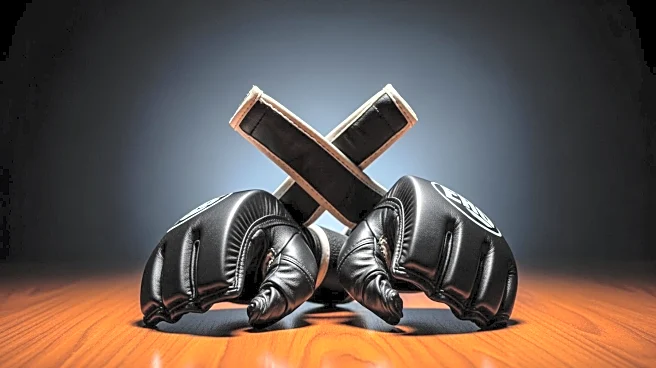What's Happening?
Former two-division UFC champion Daniel Cormier has publicly criticized Jon Jones for his harsh judgment of Tom Aspinall following UFC 321. The criticism arose after Aspinall chose not to continue his fight against Ciryl Gane due to an eye poke, leading
to the bout being ruled a no-contest. Jones labeled Aspinall a 'quick quitter,' a comment Cormier found inappropriate given the circumstances. The fight, which took place on October 25 in Abu Dhabi, UAE, was stopped in the first round. Cormier expressed his views on his YouTube channel, suggesting that Jones might be attempting to downplay Aspinall's potential threat to him as a competitor. Aspinall's professional record includes 15 wins, 3 losses, and 1 no-contest, while Gane's record stands at 13 wins, 2 losses, and 1 no-contest.
Why It's Important?
The incident highlights the ongoing tensions and rivalries within the UFC, particularly among top fighters like Jon Jones and emerging talents like Tom Aspinall. Cormier's defense of Aspinall underscores the importance of fair play and sportsmanship in combat sports, where injuries can abruptly alter the course of a fight. The criticism from Jones could impact Aspinall's reputation and future matchups, as perceptions of a fighter's resilience and toughness are crucial in the UFC. Additionally, Cormier's comments may influence public opinion and the narrative surrounding Aspinall's career, potentially affecting his marketability and opportunities within the sport.
What's Next?
The UFC community may see further discussions and debates regarding fighter conduct and the handling of injuries during matches. Aspinall's future fights will likely be scrutinized to assess his resilience and ability to recover from setbacks. Meanwhile, Jon Jones's comments could lead to increased rivalry and anticipation for potential matchups involving Aspinall. Stakeholders such as promoters, fans, and fellow fighters may weigh in on the situation, influencing the dynamics of future UFC events and fighter interactions.
Beyond the Headlines
The situation raises ethical questions about the pressure fighters face to continue competing despite injuries, and the potential long-term health implications of such decisions. It also highlights the cultural aspects of combat sports, where toughness and perseverance are highly valued, sometimes at the expense of athlete well-being. The discourse around this incident may contribute to broader discussions on fighter safety and the protocols for handling injuries in high-stakes matches.















